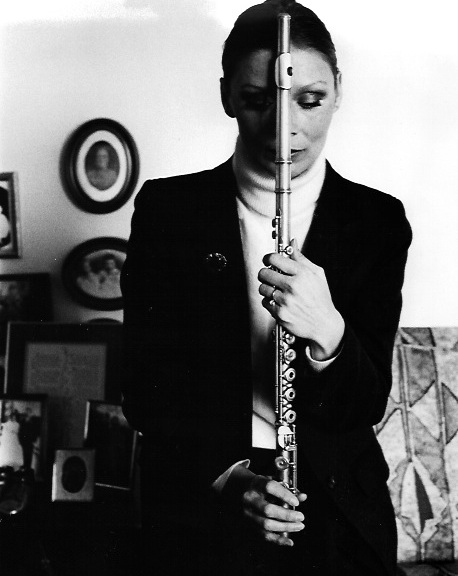Long ago I found myself in a very strange predicament; one that has had a lasting influence on my life. I wanted to study the flute seriously and was looking for a good teacher. By chance I was offered a ticket to a Minnesota Orchestra concert. During the concert I found myself listening to some gorgeous flute-playing. At one point the beauty and sonority was so compelling I found myself standing, in the front row of the first balcony. I was mesmerized. As the friend who had given me the ticket tugged my hand and I sat back down I thought ‘who is this person who can play like this?’ I learned that it was the orchestra’s Principal Flute, Sid Zeitlin.
Could I study with him? Not likely, I told myself. Someone at Orchestra Hall gave me his phone number. I called him. He wanted to hear me play. I grabbed the piece I had been most recently working on, the Telleman Suite in A minor, and went to see him at his studio at the home he shared with his wife, who also played with the Orchestra. They had a beautiful music room — very airy and spacious.
Sid barely came up to my shoulder. I recall that we stood and looked at each other for a moment. He had a round face, dark hair and a scowl that I soon learned was a frequent expression. I played for him, not sure what to expect. “Well, I’ll take you on, but that isn’t a very good piece of music. Try this.” He gave me the flute part to the Bach Second Suite, which I later learned was one of his signature pieces. A bit puzzled, but obviously elated, I left.
During the next lesson he asked to see my flute. It was a Haynes closed-hole model. “You can’t use this,” he said. “I’ll show you some open-hole flutes next lesson. You can try them out.” And so, before too long, I found that I had traded in my Haynes as partial payment for one of his Louis Lots, because I loved its sound. However, I quickly found out the the issue for me was not open v closed-holes, but that the aperture on the mouthpiece was small, and it was not easy to hit the center of each of the notes. It did not occur to me until much later that Zeitlin was, of course, aware of this and perhaps using it to test me.
I was surprised, as lessons progressed, that he did not recommend my working on any other pieces. Nor did he talk about exercise books. So I brought in what I had and he seemed uninterested in them. Something didn’t seem quite right by that point, but I had no idea what it was.
Then I received a phone call from someone at Orchestra Hall, telling me that I would not be able to take lessons with Zeitlin, as he had suffered a major heart attack while playing tennis at a Northwest Racquet Club. He was lucky to be alive. I was shocked and concerned. I let go. I had no choice. (In hindsight, I can see that I should have let go for good, as what followed became something of a nightmare for each of us.)
By this time I was starting to ask myself ‘if not him, who else would teach me?’ I also began to wonder where, other than this negative and combative orchestra environment that he was involved in, could I go to perform? There seemed to be no alternative.
In short, I did call him some six months or so later and began to take lessons again. But he was a changed man. He seemed depressed and bitter. He snapped at me. He sent me on rabbit trails. He refused to teach me orchestral excerpts (which was one of the main reasons, of course, that I wanted to study with him). But he did teach them to the young woman whose lesson was before mine, I realized one day when I arrived early — so I sat in the hallway and learned second-hand.
Some time later Zeitlin called me to say that I would need to take my lessons at his new apartment downtown. His marriage had fallen apart. I felt uncomfortable at this, though I said nothing. Soon after that he changed the lessons to a practice room at Orchestra Hall.
By this time I had learned that Zeitlin was a long-time heavy drinker, and that this could have contributed to all his problems. I offered to go with him to an AA meeting, as I was in recovery myself, but he declined. And then I came to realize that everything really had come to a dead end.
Not long after that I learned that Zeitlin had messed up a recording session and was likely to be fired. Somehow, he survived. Later I heard that he was definitely going to be fired, and for some reason I felt compelled to call the Music Director’s office and plead for his job for him. (I am sure others did as well.) The stay did not last long, however, and then I learned he was out. The next thing I learned was that he had died. I still cannot describe just how I felt — this great dream I had for him and for myself had been brought to nothing. The extraordinary tone and exquisite technique — with notes shaped like petals of a flower — had shriveled and died. To Zeitlin’s credit, he had made sure I acquired a good headjoint for the tricky Louis Lot flute he had sold me, and so I play it to this day in his memory, and to honor the gifts that he was once so blessed to have been given. But I carry a greater sorrow, that of accepting when there is nothing more one can do and the outcome is dismal. I know that is an alternative I do not want for myself or anyone else.
In hindsight, I think the problems Zeitlin was facing really stemmed from the false mindset held by many (maybe even most) professional musicians – that they have to beat themselves up in private in order to ‘play with conviction’ on the concert stage. When I would try to describe the beauty of what I was hearing him do, he would snap at me. He could not accept appreciation, no matter how well deserved. Nothing was good enough. I learned he had more insecurities than I did. The orchestral system at that time had forced him into a box.
Flute players are especially picky. They often end up with what I call ‘poodle flute-playing’ — they are so concerned about the superficial technical aspects of their playing that they miss the depth of playing that could be available to them. This is a horrible environment.
As I am, as it were, the flute player on the outside, in the fresh air (hence ‘Rossignol’) who is free from those constraints I can say, (while heaving a great sigh of relief), that constant self-criticism only tends to block the unique gift and voice (or muse) that each musician has. We have to go from ‘good’ to ‘better’ in order to keep that channel open and to be honest. We need to be in competition with ourselves, not our colleagues. We need performance opportunities that are fresh. We need music that is alive. Hence, in my case, improvisation. This is our alternative — the one that works…:-)




